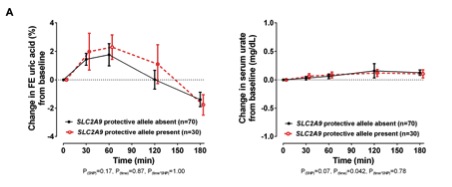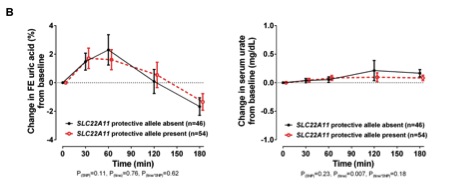Session Information
Date: Tuesday, November 15, 2016
Title: Metabolic and Crystal Arthropathies - Poster II: Epidemiology and Mechanisms of Disease
Session Type: ACR Poster Session C
Session Time: 9:00AM-11:00AM
Background/Purpose: Diuretic use is strongly associated with development of hyperuricaemia and gout. Genetic variation in the renal uric acid transporters SLC2A9 (encoding GLUT9) and SLC22A11 (encoding OAT4) has been reported to interact with diuretic use to increase the risk of developing gout at a population level. The aim of this study was to determine whether variation in SLC2A9 or SLC22A11 influences renal handling of uric acid in response to frusemide.
Methods: Following an overnight fast and one week of a low salt diet, healthy participants (n=100) aged 18-50 years attended a study visit with intake of a single oral 40mg tablet of frusemide. Blood and urine samples were obtained for urate, sodium, potassium, creatinine, prior to frusemide and then 30, 60, 120, and 180 minutes after frusemide. The SLC2A9 SNP rs11942223 and SLC22A11 SNP rs2078267 were genotyped and data were analysed based on the presence or absence of the gout-protective allele. The primary endpoint was change in fractional excretion of uric acid (FEUA) and secondary endpoint was change in serum urate.
Results: Oral intake of 40 mg frusemide led to a marked diuresis (mean (SD) urine volume 2162 (717) ml over 180 minutes) and increase in fractional excretion of both sodium (FENa) and potassium (FEK) over the 180 minute study period (P<0.001 for all). Following intake of frusemide, FEUA initially increased (mean (SD) change from baseline +1.9 (3.0) % at 60 minutes, P<0.001) and then decreased (mean (SD) change from baseline -1.5 (2.1) % at 180 minutes, P<0.001). A very small increase in serum urate was observed over the study period (mean (SD) change from baseline +0.12 (0.17) mg/dL at 180 minutes, P<0.001). At both 60 and 180 minute time-points, change in FENa predicted change in FEUA, independent of urine volume (standardized β for both time-points >0.46, P<0.001). The presence of the protective alleles for SLC2A9 and SLC22A11 did not significantly alter the FEUA or serum urate responses to the frusemide load (Figure).
Conclusion: Intake of frusemide leads to a biphasic FEUA response, with initial increase and subsequent reduction in FEUA. Our data do not support the hypothesis that genetic variation in SLC2A9 or SLC22A11 influences acute changes in renal handling of uric acid in response to frusemide intake. Figure: Mean (95% CI) change from baseline in FEUA and serum urate based on presence of A. SLC2A9 protective allele and B. SLC22A11 protective allele. Sex, ethnicity and age adjusted P values are shown. 
To cite this abstract in AMA style:
Dalbeth N, de Kwant J, Gamble G, Phipps-Green A, Horne A, Doughty R, Stamp LK, Merriman TR. The Influence of Genetic Variants on Renal Uric Acid Excretion in Response to Frusemide [abstract]. Arthritis Rheumatol. 2016; 68 (suppl 10). https://acrabstracts.org/abstract/the-influence-of-genetic-variants-on-renal-uric-acid-excretion-in-response-to-frusemide/. Accessed .« Back to 2016 ACR/ARHP Annual Meeting
ACR Meeting Abstracts - https://acrabstracts.org/abstract/the-influence-of-genetic-variants-on-renal-uric-acid-excretion-in-response-to-frusemide/

